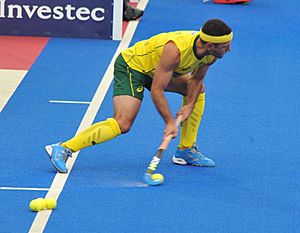Jamie Dwyer facts for kids

Script error: The function "getImageLegend" does not exist.
|
||||||||||||||||||||||||||||||||||||||||||||||||||||||||||||||||||||||||||||||||||||||||
| Personal information | ||||||||||||||||||||||||||||||||||||||||||||||||||||||||||||||||||||||||||||||||||||||||
|---|---|---|---|---|---|---|---|---|---|---|---|---|---|---|---|---|---|---|---|---|---|---|---|---|---|---|---|---|---|---|---|---|---|---|---|---|---|---|---|---|---|---|---|---|---|---|---|---|---|---|---|---|---|---|---|---|---|---|---|---|---|---|---|---|---|---|---|---|---|---|---|---|---|---|---|---|---|---|---|---|---|---|---|---|---|---|---|---|
| Born | 12 March 1979 Rockhampton, Queensland, Australia |
|||||||||||||||||||||||||||||||||||||||||||||||||||||||||||||||||||||||||||||||||||||||
| Height | 172 cm (5 ft 8 in) | |||||||||||||||||||||||||||||||||||||||||||||||||||||||||||||||||||||||||||||||||||||||
| Playing position | Centre | |||||||||||||||||||||||||||||||||||||||||||||||||||||||||||||||||||||||||||||||||||||||
| Club information | ||||||||||||||||||||||||||||||||||||||||||||||||||||||||||||||||||||||||||||||||||||||||
| Current club | easts in brisbane | |||||||||||||||||||||||||||||||||||||||||||||||||||||||||||||||||||||||||||||||||||||||
| Senior career | ||||||||||||||||||||||||||||||||||||||||||||||||||||||||||||||||||||||||||||||||||||||||
| Years | Team | Apps | (Gls) | |||||||||||||||||||||||||||||||||||||||||||||||||||||||||||||||||||||||||||||||||||||
| 1998–2010 | Queensland Blades | 232 | ||||||||||||||||||||||||||||||||||||||||||||||||||||||||||||||||||||||||||||||||||||||
| 2009, 2012 | Bloemendaal HC | 350 | ||||||||||||||||||||||||||||||||||||||||||||||||||||||||||||||||||||||||||||||||||||||
| 2013–2015 | Punjab Warriors | 14 | (4) | |||||||||||||||||||||||||||||||||||||||||||||||||||||||||||||||||||||||||||||||||||||
| 2016–2017 | Uttar Pradesh Wizards | |||||||||||||||||||||||||||||||||||||||||||||||||||||||||||||||||||||||||||||||||||||||
| National team | ||||||||||||||||||||||||||||||||||||||||||||||||||||||||||||||||||||||||||||||||||||||||
| Years | Team | Apps | (Gls) | |||||||||||||||||||||||||||||||||||||||||||||||||||||||||||||||||||||||||||||||||||||
| 2001–2016 | Australia | 365 | (244) | |||||||||||||||||||||||||||||||||||||||||||||||||||||||||||||||||||||||||||||||||||||
|
Medal record
|
||||||||||||||||||||||||||||||||||||||||||||||||||||||||||||||||||||||||||||||||||||||||
| Last updated on: 13 April 2015 | ||||||||||||||||||||||||||||||||||||||||||||||||||||||||||||||||||||||||||||||||||||||||
Jamie Dwyer is a famous Australian field hockey player. He was born on March 12, 1979. Many people think he is one of the best field hockey players ever. He has played in many important games for Australia.
Jamie has won gold medals at the 2004 Summer Olympics, the 2010 Men's Hockey World Cup, and the 2014 Men's Hockey World Cup. He also won gold at the 2006 Commonwealth Games and the 2010 Commonwealth Games. He played over 365 matches for Australia and scored more than 244 goals!
Contents
About Jamie Dwyer
Jamie Dwyer was born in Rockhampton, Queensland, Australia. When he was a kid, he enjoyed playing cricket. He is a big fan of the Brisbane Lions football team. Jamie is married and has two sons and a daughter. He met his wife while playing hockey in the Netherlands.
Playing Field Hockey
Jamie Dwyer plays as a midfielder or a striker in field hockey. These positions are important for both defending and scoring goals. In 1999, he received a special scholarship to play for the Australian Institute of Sport team.
Club Teams
Jamie has played for several club teams in Australia. In 1998, he played for the Easts club in Brisbane. He currently plays for YMCC Coastal City Hockey Club in Perth, Western Australia. He has helped his team win four championships since 2011.
Playing Overseas
Jamie also played professional hockey in Europe. He spent time playing in the Netherlands in 2004, 2005, and 2006. The hockey season there lasts for seven months. He also played for RC Polo Barcelona in 2006 and for Mannheim in Germany in 2011. Later, he played in India for the Punjab Warriors.
State Team
Jamie played for the Queensland Blades in the Australian Hockey League. He wore the number 1 shirt for his team.
National Team
Jamie Dwyer started playing for Australia's junior national teams (Under 18 and Under 21) in 1995. He continued playing for the junior teams until 1998.
He joined the senior national team in 2001. Since then, he has played over 300 matches and scored more than 200 goals for Australia.
- 2001: He won a silver medal at the Champions Trophy.
- 2002: He won a silver medal at the World Cup and a gold medal at the 2002 Commonwealth Games.
- 2004: Jamie scored a goal in extra time at the 2004 Summer Olympics final. This goal helped Australia win the gold medal!
- 2005: He earned a gold medal at the Champions Trophy.
- 2006: He won a silver medal at the World Cup and another gold medal at the 2006 Commonwealth Games.
- 2008: His team finished first in the Champions Trophy. He also won a bronze medal at the 2008 Summer Olympics.
- 2009: He won a gold medal at the 2009 Men's Hockey Champions Trophy.
- 2010: Jamie was a key player when Australia won gold at the Hockey Champions Trophy, the 2010 Commonwealth Games, and the World Cup. He even captained the team and scored a goal in the Commonwealth Games gold medal match.
- 2012: He was part of the Australian men's national training squad for the 2012 Summer Olympics. Australia won a bronze medal at these Olympics.
Coaching Hockey
Jamie Dwyer has also coached field hockey. In 2011, he coached a junior boys team at the YMCC Coastal City Hockey Club. He also held clinics for young hockey players at the Joondalup Lakers Hockey Club in 2011. In 2019, he coached a junior team at the YMCC Coastal City Hockey Club again.
Awards and Recognition
Jamie Dwyer has received many awards for his amazing skills:
- 2002: Named Young Hockey Player of the Year by the International Hockey Federation.
- 2004 & 2007: Named the IHF World Player of the Year.
- 2005: Awarded the Medal of the Order of Australia (OAM).
- 2007: Named the Captain of the World Team.
- 2011: Named the international field hockey player of the year and included in the World All-Star Team.
- 2011: Inducted into the Australian Institute of Sport 'Best of the Best'.
- 2012: Chosen to lead the Australian team at the London Olympics.
- 2021: Inducted into the Sport Australia Hall of Fame.
 | Janet Taylor Pickett |
 | Synthia Saint James |
 | Howardena Pindell |
 | Faith Ringgold |

